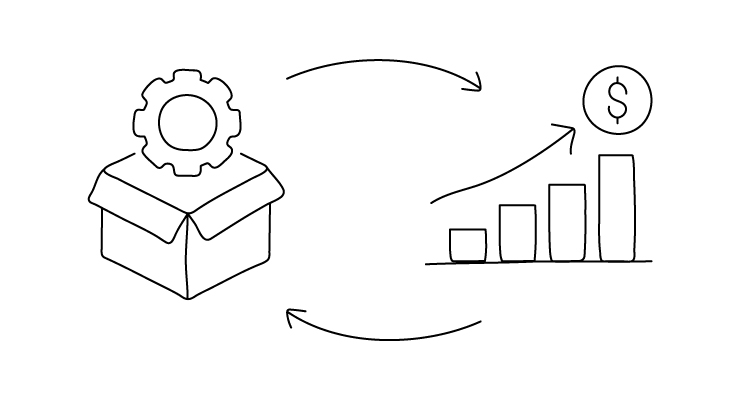
As we all know, businesses face constant pressure to innovate. They need to stay ahead of the competition.
One key enabler of this transformation is product engineering. It plays a crucial role in shaping the future of products, services, and entire organizations.
Product engineering helps in several ways. It reduces operational costs, improves product quality, and shortens time-to-market.
Product engineering services are critical for businesses. They help align products with market needs while ensuring sustainability and scalability.
In this blog, we will explore the role of product engineering in business transformation. We’ll also discuss how it contributes to successful product development strategies.
What is Product Engineering?
Product engineering involves designing, developing, and delivering a product. The goal is to meet market demands while optimizing performance and functionality.
It covers everything, from the initial concept to prototype development. It also includes the manufacturing process and continuous product improvement.
The main objective of product engineering is clear. It’s to ensure the product is well-designed, cost-effective, and scalable for production.
The product engineering process has multiple phases. These phases require close collaboration between cross-functional teams.
Engineers, designers, marketers, and operations specialists all play a role. They work together to bring the product to life.
Key Phases of the Product Engineering Process:
- Conceptualization: Defining the product idea, goals, and target market.
- Design and Prototyping: Creating a prototype and refining the design based on feedback and testing.
- Development: Developing the final product, ensuring functionality, quality, and performance.
- Testing: Conducting various tests to ensure the product meets regulatory standards and user expectations.
- Manufacturing and Launch: Scaling production and bringing the product to market.
The Role of Product Engineering in Business Transformation
1. Enabling Innovation and Market Relevance
One of the key ways product engineering contributes to business transformation is by fostering innovation.
As technology advances and customer expectations change, businesses must adapt quickly. To remain competitive, they must evolve.
Product engineering helps businesses stay relevant. It enables them to design and develop cutting-edge solutions that meet market needs.
By focusing on product engineering transformation, businesses can refine their products. They can incorporate the latest technologies and trends.
This includes integrating Artificial Intelligence (AI), the Internet of Things (IoT), and other emerging technologies. These integrations ensure products are forward-thinking and innovative.
For example, companies like Tesla have transformed the automotive industry. They have done this through constant innovation in product engineering.
Tesla’s focus on electric vehicles (EVs) and autonomous driving technology has reshaped the market. This innovation has positioned Tesla as a leader in the future of transportation.
2. Streamlining Product Development
Effective product development is not just about a great idea. It’s about transforming that idea into a tangible product. The product must meet customer expectations and be delivered on time.
Product engineering plays a central role. It streamlines the development process, reduces bottlenecks, and ensures efficiency at every stage.
Well-established product engineering processes offer several benefits. They help reduce development time and lower costs. They also improve product quality.
The integration of automation, smart manufacturing, and robust supply chain management is key. It ensures products are built faster, at a lower cost, and with higher precision.
This is especially important in industries where speed to market can determine success or failure.
3. Enhancing Collaboration Across Teams
The role of product engineering extends beyond the engineering team itself. Successful product development requires collaboration. Different teams must work closely together. These teams include marketing, sales, design, and customer support.
Engineers need to understand customers’ needs and desires. Designers must also be aware of the product’s technical constraints.
Integrating product engineering with other business functions is key. It helps ensure that products are well-engineered and aligned with market demands.
This cross-functional collaboration fosters innovation. It enables businesses to quickly adapt to changes in the market.
4. Improving Product Quality and Reliability
In today’s competitive business landscape, quality is crucial. It directly impacts customer satisfaction and retention.
Product engineering helps ensure products meet high-quality standards. It ensures they perform well in real-world conditions and remain durable over time.
This is especially important in industries like aerospace, automotive, and healthcare. In these fields, product reliability is non-negotiable.
Advanced testing techniques and quality control measures help businesses. They identify potential issues early in development. This reduces the risk of defects and costly recalls.
Additionally, product engineering teams focus on consistency and precision in manufacturing. This delivers a superior experience to customers.
5. Supporting Scalability and Sustainability
As businesses grow, they must ensure that their products can scale with demand. Product engineering plays a critical role in product scalability. This includes expanding production capacity, integrating with other systems, and entering new markets.
Sustainability has become a major concern for both businesses and consumers.
Engineers are now focusing on creating energy-efficient products. These products use sustainable materials and are easy to recycle or repurpose at the end of their lifecycle.
By incorporating sustainability into the product engineering process, businesses can reduce their environmental impact. They can also meet the growing demand for eco-friendly products.
6. Reducing Costs and Optimizing Resources
Another critical aspect of product engineering in business transformation is cost management. By refining the engineering process and leveraging advanced technologies such as simulation tools, businesses can reduce waste and optimize the use of materials. This results in cost savings that can be reinvested into further innovation or passed on to consumers through lower prices.
Moreover, product engineering helps businesses optimize resource allocation by identifying inefficiencies and streamlining processes. From reducing overhead costs to improving supply chain management, product engineering services help businesses maximize profitability without compromising quality.
7. Enhancing Customer Experience
Product engineering doesn’t stop at creating the product—it extends to the entire lifecycle, including customer support, updates, and enhancements. The role of product engineering in business transformation involves ensuring that products are not only functional but also intuitive and enjoyable to use.
Businesses can create products that delight customers and foster long-term loyalty by focusing on the user experience (UX) and continuously iterating based on user feedback. Businesses often rely on customer data and analytics to inform product improvements, ensuring they meet changing consumer preferences.
8. Enabling Agile Transformation
In today’s fast-paced business world, agility is key. The product engineering transformation process allows businesses to embrace an agile approach to product development. By using agile methodologies, teams can quickly adapt to changes in requirements, customer feedback, or market conditions.
This flexibility enables businesses to iterate rapidly, release new features more frequently, and stay ahead of competitors. Moreover, agile product engineering ensures businesses can scale and evolve their products as needed, whether by adding new functionalities or optimizing existing ones.
Conclusion
In a world of constant change, businesses must embrace transformation to stay competitive. Product engineering is at the heart of transformation. It drives innovation, streamlines development processes, and improves quality. It also ensures scalability.
By investing in product engineering services, businesses can do more. They can create better products and align operations with market demands.
Product engineering plays a key role in business transformation. It helps reduce costs, enhance collaboration, and improve customer experience.
By using robust engineering processes, companies can turn their vision into reality. They can deliver products that meet customer needs and position themselves for long-term success.
If you’re ready to navigate the complexities of product development, it’s time to partner with an expert team.
